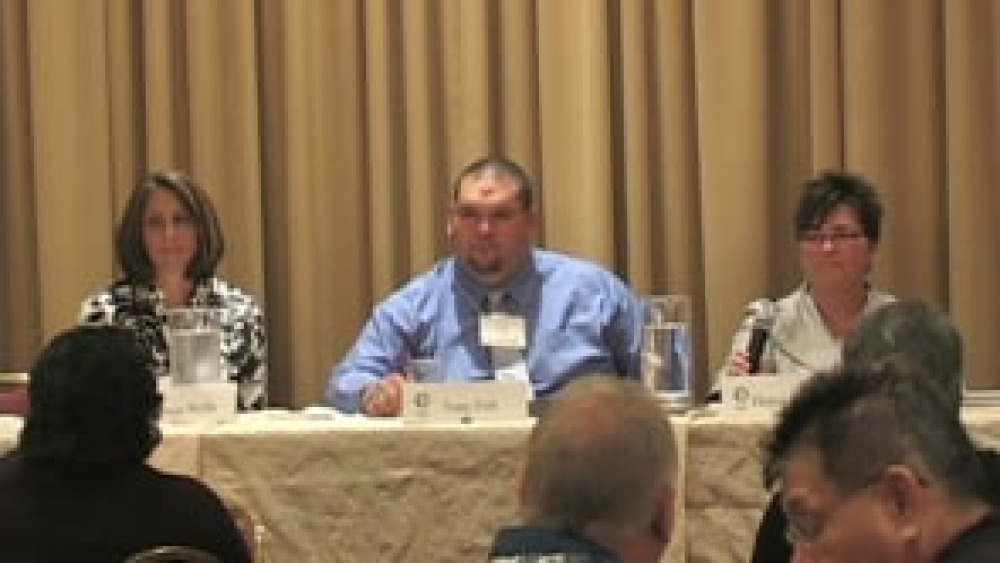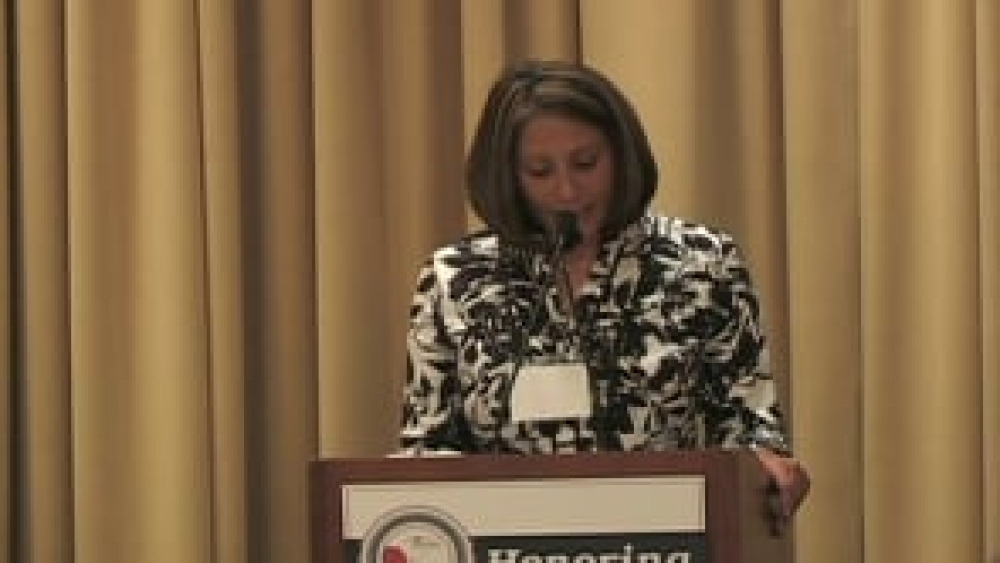Choctaw Nation Healthy Lifestyles Program Director Joyce Wells describes how a 16-year-old Choctaw citizen transformed her idea and passion into a comprehensive education and mentoring program that seeks to prevent domestic violence in Choctaw communities.
Additional Information
Wells, Joyce. "Project Falvmmichi." Honoring Nations symposium. Harvard Project on American Indian Economic Development, John F. Kennedy School of Government, Harvard University. Cambridge, Massachusetts. September 16-18, 2009. Presentation.
Transcript
"And I just wanted to kind of start today to tell you about our program. It started back in 2004 and it was started by a 16-year-old student. She is a Choctaw member and in fact, we have her in the audience today; she goes to Harvard, her name is Claire Richards -- she's back in the back. We're just really thrilled to be a part of Claire's life and for her to have allowed us to work on this program. Like I said, it started back in 2004. She had got a proposal together basically -- at 16 years old -- and went and met with tribal leaders with the Choctaw Nation and let them know that she had some concerns and had done some research. She had found out that for the Choctaw Nation in our rural area, there was a great number of individuals with diabetes, with obesity, with domestic violence, with depression and she just felt like that the domestic violence was something that she wanted to try and change in those communities. She also found out that in the Indian child welfare cases that a high number of those did relate back to domestic violence. With that said, she wanted to train high school students to be mentors to elementary students and to teach those students that it was 'not cool to hit.' That's just a phrase that you hear all the time, those second graders know automatically. That's the main phase in Project Falvmmichi. Claire reviewed dozens of existing curriculum and she visited with state professionals, with volunteers, with tribal individuals, people that [were] educated in the causes of domestic violence and she pulled from all of that information to develop the curriculum for Project Falvmmichi.
She chose the name Project Falvmmichi because in Choctaw 'Falvmmichi' means 'to reclaim,' and she wanted to reclaim youth from the continuing cycle of domestic violence. She wanted to teach the children to learn new ways to deal with anger. Instead of hitting or lashing out at someone else, to figure out and to give them new ways to deal with those thoughts instead of hitting anyone. In May of 2006 Claire handed over Project Falvmmichi to the Choctaw Nation Healthy Lifestyles Program and in partnership with the Youth Advisory Board that's with the Choctaw Nation. Now in its sixth year, we went from five schools in the very beginning and we're now currently in 35 schools of our 76 schools in the Choctaw Nation. We're in 63 classrooms a month, so we're seeing around 1,300 second-grade students and we have over 300 mentors, high school mentors. What we call the mentors or what Claire chose to call the mentors was [Choctaw language], which means 'friend' in Choctaw. The Choctaw Nation is also blessed to have many adult sponsors that are just volunteers throughout the community that helps to work with those mentors. We also, with Choctaw Nation Healthy Lifestyles, we have several staff that are able to go out and assist when possible or when needed.
The teen mentors are in 8th through 12th grade. We usually have a training at the first of each school year. They're trained on what domestic violence is, they are also trained on confidentiality, what the lesson plans are and what the crafts and activities will be when they go into the classroom. Once trained, the mentors go into the second-grade classroom for 45 minutes a session and they are there for eight months of the school year. They go in every month. Each lesson consists of a puppet skit, a craft activity and always the message is around the single thing that it's not cool to hit. After the skit, the mentors talk about the message with those second-grade students and they answer questions, they summarize the points, they talk about anything with those second graders that might be on their mind. They then break into small groups, usually there's no more than maybe six, and they'll have one teen mentor with those six students. The second graders love those teen mentors and will confide in them about anything. Our mentors are trained that if it is a situation that they find out about with that second grader that's concerning to them, they know to go to their adult sponsor and then the teacher and then they'll handle that through the counselor at the school.
A poster is also left in the classroom to help the teachers and the students to remember throughout the month that it's not cool to hit. With that said, the second graders are not the only ones that are learning something in this process. The teen mentors learn how to be a good listener, they learn how to be compassionate, patient and encouraging, they learn to praise the children and to acknowledge their strengths, they learn to display good habits as the second graders are always watching them. Our communities are extremely small, so they see those high school students everywhere. The mentors also learn to -- they become leaders. We've seen that happen in a lot of the communities with those students that we're working with. At first some of them are a little bit leery of getting in front of even the second-grade students but usually, within a few, couple of times of the practicing and getting in there, they're ready just to take the show on the road. They have...it really boosts their self-esteem as well.
As I said, Claire did hand the program over to us. Our desire is to be in every second-grade classroom within the Choctaw Nation. Like I said, we're currently working on that. We have been able to gain a few more staff in the past years and we're hoping to do so hopefully in the next couple of years. We've seen that in some instances that it has made a difference. We've seen where that in some of the second-grade classrooms that counselors did find out about some domestic abuse or child abuse that was going on in homes and those have been reported and taken care of. The first year that we [were] in the program when Claire was still along with us before she went off to college, one of the schools, they had a second grader that they had been in the class with and that second grader had had a surgery and passed away. And so the next day the kids were in class and they were trying to bring in counselors for those students and the students asked for those teen mentors. They wanted them to come in and they needed their consoling. That's just one of the many stories that we hear now.
There's been a few cases where that there was maybe a few children that might have been acting out in the second grade and when they moved on to third grade, some of the mentors would pull that student in to help them go into the second graders' classroom to teach them again that it's not cool to hit, and so they felt like they were being a leader and in return that helped them to kind of close off the hitting aspect of it. That's our program in a nutshell and I'll be glad to talk to you afterwards if you have any questions. Thank you."


